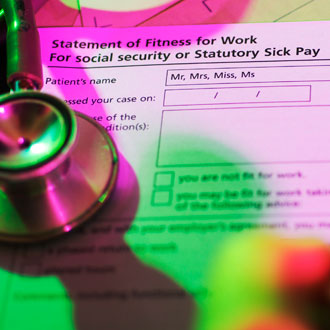GPs will no longer need to issue sick notes for patients off work for longer than four weeks under a new occupational health scheme to be launched in the Spring.
But the Government has admitted the service will only offer face-to-face consultations with occupational therapists in a ‘minority’ of cases – the majority being dealt with over the phone or online.
The new national occupational health service – dubbed ‘Fit for Work’ – is currently being piloted by 20 practices in Sheffield, with a view to it being rolled out across the rest of the UK from the spring.
Under the scheme, GPs will refer patients likely to be absent for four weeks or longer for an assessment by a Fit for Work occupational health specialist, who will then set up a ‘return to work’ plan with the patient – from which point the GP no longer needs to sign the patient’s fit note.
DWP guidance for GPs explains that patients will undergo an initial assessment over the telephone within two working days of referral, or a face-to-face assessment with five working days ‘if deemed appropriate’.
However, it goes on to explain that face-to-face assessments will only be done in a minority of cases.
‘Where a face-to-face assessment is required (expected to be in a minority of cases) Fit for Work will pay reasonable travel expenses at your patient’s request,’ it states.
The service was developed following a series of pilots, some of which showed positive results in helping patients back to work.
For example, one project in Leicester saw two-thirds of absentees able to return to work.
However, Dr Rob Hampton, Leicester GPSI in occupational health who led the pilot, cautioned that the majority of patients had mental health problems that required intensive case management.
If a patient has failed to go back to work or find alternative employment or training after three months, they are automatically discharged from the Fit for Work service.
Dr Richard Vautrey, deputy chair of the GPC, said: ‘This could be a helpful service and may provide access to occupational health advice that is currently lacking, but the expectation that most of this advice would be done on the telephone rather than face to face may not meet the needs of many patients who have complex, and particularly psychological problems that prevent them from returning to work. This is a voluntary service and it must remain so for GPs and patients to have confidence in it.’
GPC negotiator Dr Dean Marshall said the GPC had given feedback and was aware of concerns expressed by the occupational therapists about the reliance on advice by telephone.
Dr Marshall said: ‘This new service was developed by DWP and we gave them our feedback and commented on their guidance for GPs, patients and employers. I am aware that occupational health specialists have concerns about how useful the service will be considering that it will be delivered by telephone.’
Dr Marshall stressed that GPs would not use the service if they felt it was not offering sufficient support, and that the GPC would ‘wait and see’ what feedback comes from it.
He added: ‘The service is not mandatory for GPs or patients and will therefore not be used if the fears of some are well founded. It provides some support for GPs who currently have no occupational health support to deal with patients who are unfit for work so we will have to wait and see what the feedback is from all sides.’
Related stories
Back-to-work service for long-term sick to launch this year
Case study: How we enabled potential long-term sick patients to get back to work
The DWP said it expects Fit for Work to cut sick pay costs to business by £80m and increase economic output by up to £900m a year.
The service has been outsourced to multinational Maximus in England and Wales, but will be run by the Scottish government in Scotland.
Work and Pensions Minister Lord Freud said: ‘Being in work is good for people’s wellbeing and it is also important for business growth that sickness absence is managed properly. That’s why we accepted the recommendations from a review for an independent support service.
‘GPs will provide a vital role in referring patients – with their agreement – to Fit For Work. Support also includes an independent occupational health assessment and a Return to Work Plan to help them return to and stay in work. It’s important we get this right so are starting in one area to build on learning.’
Pulse October survey
Take our July 2025 survey to potentially win £1.000 worth of tokens













